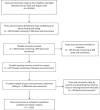A thematic cluster analysis of parents' online discussions about fussy eating
- PMID: 35132813
- PMCID: PMC8932712
- DOI: 10.1111/mcn.13316
A thematic cluster analysis of parents' online discussions about fussy eating
Abstract
Food fussiness is associated with non-responsive parent feeding practices, such as persuasive and instrumental feeding. Although most children described as 'fussy eaters' are likely exhibiting developmentally typical behaviours, up to half of the parents of children 2-5 years old express concerns. Concern for fussy eating may mediate the use of non-responsive feeding practices and so must be addressed in parent feeding interventions. Therefore, it is critical to better understand parents' concerns and how they may relate to feeding practices. This study aimed to explore how parents' feeding practices and the social cognitive factors that may drive them clustered based on parents' concern for fussy eating. Data were collected from parent discussions of fussy eating on a Reddit forum (80,366 posts). Latent Dirichlet allocation was used to identify discussions of fussy eating. Relevant posts (1542) made by users who identified as a parent of a fussy eater (n = 630) underwent qualitative coding and thematic analysis. Five clusters of parents were identified, ranging in size from 53 to 189 users. These were primarily characterised by parents' degree of concern and feeding practices: (1) High concern, nonresponsive; (2) Concerned, nonresponsive; (3) Low concern, responsive; (4) Low concern, mixed strategies; (5) Low concern, indulgent. Parents who used responsive practices tended to be less concerned for fussy eating, have greater trust in their child's ability to self-regulate hunger, have longer-term feeding goals, and exhibit greater ability for personal self-regulation. Future research should further examine how these constructs may be leveraged in parent feeding interventions.
Keywords: child, preschool; cluster analysis; diet, food, and nutrition; feeding-related behaviour; infant; parents; qualitative research.
© 2021 The Authors. Maternal & Child Nutrition published by John Wiley & Sons Ltd.
Conflict of interest statement
The authors declare that there are no conflict of interests.
Figures
Similar articles
-
'Fussy eating' and feeding dynamics: School children's perceptions, experiences, and strategies.Appetite. 2022 Jun 1;173:106000. doi: 10.1016/j.appet.2022.106000. Epub 2022 Mar 9. Appetite. 2022. PMID: 35278591
-
Perceived fussy eating in Australian children at 14 months of age and subsequent use of maternal feeding practices at 2 years.Int J Behav Nutr Phys Act. 2017 Sep 11;14(1):123. doi: 10.1186/s12966-017-0582-z. Int J Behav Nutr Phys Act. 2017. PMID: 28893283 Free PMC article.
-
Fussy eating in toddlers: A content analysis of parents' online support seeking.Matern Child Nutr. 2021 Jul;17(3):e13171. doi: 10.1111/mcn.13171. Epub 2021 Mar 19. Matern Child Nutr. 2021. PMID: 33739624 Free PMC article.
-
Childhood fussy/picky eating behaviours: a systematic review and synthesis of qualitative studies.Int J Behav Nutr Phys Act. 2020 Jan 3;17(1):2. doi: 10.1186/s12966-019-0899-x. Int J Behav Nutr Phys Act. 2020. PMID: 31900163 Free PMC article.
-
Mothers' perspectives on toddlers' picky eatER behaviour: A systematic review.Afr J Reprod Health. 2024 Oct 31;28(10s):499-507. doi: 10.29063/ajrh2024/v28i9.50. Afr J Reprod Health. 2024. PMID: 39641488
Cited by
-
Fussy Eating Rescue, a mobile-web app for responsive feeding practises among parents of toddlers: protocol for a pilot randomised controlled feasibility trial.Pilot Feasibility Stud. 2023 Jul 22;9(1):128. doi: 10.1186/s40814-023-01278-2. Pilot Feasibility Stud. 2023. PMID: 37481664 Free PMC article.
-
Scoping the Priorities and Concerns of Parents: Infodemiology Study of Posts on Mumsnet and Reddit.J Med Internet Res. 2023 Nov 28;25:e47849. doi: 10.2196/47849. J Med Internet Res. 2023. PMID: 38015600 Free PMC article.
References
-
- Aponte, C. A. , & Romanczyk, R. G. (2016). Assessment of feeding problems in children with autism spectrum disorder. Research in Autism Spectrum Disorders, 21, 61–72. 10.1016/j.rasd.2015.09.007 - DOI
-
- Baumgartner, J. , Zannettou, S. , Keegan, B. , Squire, M. , & Blackburn, J. (2020). The pushshift reddit dataset. Proceedings of the International AAAI Conference on Web and Social Media.
-
- Benton, A. , Coppersmith, G. , & Dredze, M. (2017). Ethical research protocols for social media health research. Proceedings of the First ACL Workshop on Ethics in Natural Language Processing.
-
- Bird, S. , Klein, E. , & Loper, E. (2009). Natural language processing with Python: analyzing text with the natural language toolkit. O'Reilly Media, Inc.
Publication types
MeSH terms
LinkOut - more resources
Full Text Sources
Medical


